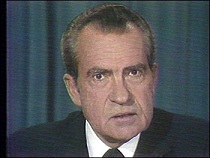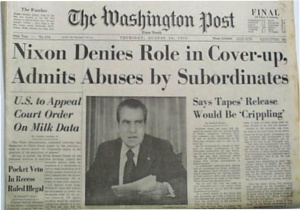
Richard Nixon, our 37th President, resigned in disgrace in 1974 after the Watergate scandal brought down his presidency. The major players can be separated into those who would do the right thing and tell the truth, and those who would continuously deny and lie about the crimes that were committed to protect Nixon, the man they'd remain loyal to no matter what.
For those that don't remember or were too young or not born when Watergate was going on, this is the Cliff-notes version:
Nixon had his plumbers and his slush funds
Re-elect the President is what was on their minds.
Burglars were caught breaking into Democratic headquarters.
Good god! Woodward and Bernstein followed the scandal all the way through to the White House.
Nixon and his men denied, denied, denied.
The public wanted to know what did the President know and when did he know it.
We had a Saturday night massacre
Nixon said "I am not a crook" despite the cancer on his presidency
But there are tapes -
Nixon said we can't have them.
The Supreme Court said yes we can
But there's an 18 and 1/2 minute gap
It was accidently erased by a secretary
Ya think there might be something interesting in those 18 1/2 minutes?
The tapes were the smoking gun
Congress said impeach
Nixon resigned, Ford became President, Ford pardoned Nixon. End of story.
Ok. Ok. Even those who were old enough probably don't remember these events. When Watergate was going on, I was 13 years old. I didn't like Nixon and was already leaning Democratic, but for the life of me couldn't understand what the fuss was about. What could Nixon have done that was so bad he'd have to be impeached for it? It turns out that yes, 5 men broke into the Democratic headquarters at the Watergate hotel and they were caught. And Nixon and his men used all the levers of government to cover up the connections that went straight to the White House. I always found it fascinating, so fascinating that I read "All The President's Men" twice and saw the movie about 12 times.
Don't worry. I'm not going to go all Woodward-Bernstein on you and recite all the events, payoffs, slush funds, lies, and dirty tricks the Nixon White House pulled. A little recap, however, is necessary. Somewhere around 1971, 3 years after his election, Nixon formed a group of men called "The Plumbers". Their task was to stop leaks to the press, hence the name. What evolved was the plumbers running a series of dirty tricks against Nixon's enemies. Their first task was to dig up dirt to smear Daniel Ellsberg, the one who leaked the Pentagon Papers, by breaking into Ellsberg's psychiatrist's office. One of their more famous tricks was done to Democratic candidate Edmund Muskie. Two weeks before the New Hampshire primary, someone wrote a letter to a New Hampshire paper accusing Muskie of condoning the racial slur "Canucks". Muskie had a temper tantrum and cried on television, which eventually led to his demise and the rise of George McGovern, the very liberal candidate Nixon wanted to run against in the first place. The letter was written by someone at the White House as part of the plumbers operation, and Nixon won 49 states against McGovern. Dirty tricks work!
Watergate is known as Watergate because in a plot to bug Democratic headquarters in the Watergate office complex, 5 burglars were caught. Woodward and Bernstein first linked White House operative E. Howard Hunt to the burglary. Hunt's response to the inquiry from Woodward was to say "Good God!" and hang up the phone. Woodward and Bernstein kept digging and their paper the Washington Post kept publishing stories of how the White House was involved in the break-in, cover-up, and other dirty tricks. Woodward made use of a shadow source known as "Deep Throat" who guided his investigations but remained anonymous. The stories of White House corruption kept coming, and the White House denied everything. The rest of the country ignored them as Nixon won re-election in one of the largest landslides in history.
As Nixon began his second term in 1973 the evidence mounted so much that a Senate committee was formed and a special prosecutor, Archibald Cox, was named to investigate possible presidential misdeeds. White House counsel John Dean was the first high ranking official to tell the truth and admit that high ranking officials were deeply involved by telling Nixon and later the Watergate committee "There is a cancer growing on the Presidency." Dean's testimony gave strong credibility to those who were claiming that the Watergate scandal went deep into the Nixon White House, while it severely weakened the administration's constant public denials of any involvement.
The Senate committee brought in many officials from the Nixon administration to testify, but on July 16 a former aide to the President Alexander Butterfield made a startling revelation to the committee: there was a taping system in the oval office that recorded all conversations Nixon had with all of his aides. Perhaps there was evidence of Nixon's involvement on the tapes? Ya think? The knowledge of the taping system set up a new chain of events that broke open the scandal even further. The Senate committee and prosecutor Cox both issued subpoenas for the tapes and Nixon refused to hand them over, citing executive privilege. The tapes became the main focus of the investigation, as Cox and the Senate committee wanted the tapes in their entirety, while Nixon offered to provide summaries of the tapes. Neither side gave in, and the matter of the tapes was sent to the US Supreme Court to review. Meanwhile, another event that would shape history occurred. Vice President Spiro Agnew was forced to resign because of bribery and tax fraud charges unrelated to Watergate, and he was replaced by Michigan congressman Gerald Ford. Hold that thought.
On October 19, 1973 special prosecutor Cox refused Nixon's offer to provide a summary of the tapes. Cox continued to insist on obtaining the tapes unedited in their entirety. Nixon then found the solution to the special prosecutor problem - fire him. On October 20, Nixon ordered his Attorney General Elliot Richardson to fire Cox. Richardson refused and resigned in protest. Nixon then ordered deputy Attorney General William Ruckelshaus to fire Cox, and Ruckelshaus also resigned in protest. The next in line was Solicitor General Robert Bork, who complied with Nixon's request and fired Cox. This flurry of events became known as the "Saturday Night Massacre".
Soon after, Nixon made his famous remarks in a televised news conference.
And in all my years of public life, I have never obstructed justice. And I think, too, that I could say that in my years of public life, that I welcome this kind of examination, because people have got to know whether their President is a crook. Well, I am not a crook. I have earned everything I have got.
But the trouble and suspicion only continued. On November 21, 1973 the it was discovered that two of the subpoenaed tapes were missing, and another had an 18 minute gap. The one with the gap was dated just 3 days after the Watergate burglary. Ya think there might be something interesting in those 18 minutes? Then in a bizarre twist, Nixon's personal secretary Rosemary Woods admitted to mistakenly erasing the tape when transcribing it. But she only accounted for 5 minutes of the 18 minutes. Any amateur investigator had to conclude at this point that Nixon's and his aides had destroyed the most incriminating evidence. We'll never know.
Most of 1974 was spent with the White House, Congress, and the special prosecutor wrangling over the rest of the tapes. The Supreme Court on July 24 finally ruled that the tapes had to be turned over. Congress began to draw up articles of impeachment which would remove Nixon from office. It turns out Nixon was a crook and he had nowhere to go. On August 8, 1974 Nixon resigned as President. Vice President Gerald Ford was sworn in as President to fill the remainder of Nixon's term in office. Exactly 1 month later on September 8, 1974 Ford issued a pardon to Nixon so that Nixon would not be prosecuted for his crimes and theoretically the country could move on.
The country survived Watergate and some laws are in place to prevent the complete abuse of power that Nixon orchestrated. But politicians still find their ways to abuse power and enrich themselves or to get re-elected. There must be some great perks to being a politician. Nixon became the wise old elder statesman as his advice was sought after even though he'd admitted his involvement in Watergate once out of office. Ford lost re-election in 1976 perhaps because the country couldn't forgive him for pardoning Nixon. Deep Throat was finally revealed in 2005 to be FBI agent Mark Felt. And now any scandal when people in public life get caught now has the convenient "gate" added to it. Look up Billy-gate, Iran-gate, Contra-gate, Monica-gate, spy-gate, trooper-gate, and many others. It's now part of our vernacular.









ASNAIRA
This is considered such a potvial moment in journalism because two journalists, Woodward and Bernstein, truly defined what it means to be an investigative journalist. They went to great leaps and bounds to uncover the truth to a story, despite all of the harsh criticism that they received and the political red tape that they had to maneuver around. Both these reporters, as well as the Washington Post newspaper, showcased the media influencing history and uncovering downplayed facts of a huge cover-up scandal. The entire Watergate incident may not have been as well known, or dealt with as severely, if not for the intense media coverage. I believe that today, even more so than 30 years ago, there would be far more red tape to uncover. Governmental actions today seem a lot more covered up and done in secret than those of the past. Reporters seem to have much more of a hard time exposing such an enormous scandal without any sort of repercussions. Many may also be hesitant to report anything that could be deemed sensational for fear of losing their job if the information does not turn out to be one hundred percent accurate. The Watergate legacy is really one of the major opportunities for Americans to see the intricate corruption that can take place at the governmental level. This experience perhaps opened the eyes of American citizens, forcing them to question what goes on in government and to not necessarily place blind faith and trust in the government. The Watergate legacy also shows the power of journalism. This is one instance where exposing the story or not could have made a difference in how history was played out. The only method that I found truly unethical for Woodward and Bernstein was the action of contacting the juror in the Watergate court case. This actual is a crime and they almost faced serious consequences for breaking the law. Trying to coerce information out of a juror does cross a bit of an ethical line. Had the juror decided to give away information, Woodward and Bernstein could have been sent to jail. Also, the juror may have had to be removed from the case, thus delaying the trial. The one instance of blatant editorializing that struck me was Streitmatter referring to Nixon was the “mean-spirited, lying, foul-mouthed bigot” (pg.216). Regardless if this was truly reflective of Nixon’s personality or not, it just seems to be a blatant attack on Nixon by Streitmatter. It seems to showcase his own personal feelings of Nixon rather than simply stating the facts of the case. Streitmatter is clearly imputing his own views about Nixon rather than letting the reader decide for his or her self.